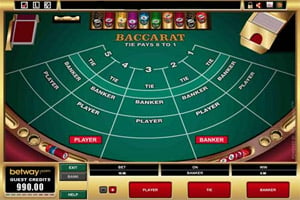
A Definitive Guide to Playing Online Baccarat

Why the Banker wins more in Baccarat
If you've done your homework on the game of baccarat you probably know that betting on the banker is better than betting on the player. While both wagering options are amongst some of the better bets that you can make at online casinos, the banker bet carries a 1.06% house edge and the player bet 1.24%.
In fact, the banker bet wins more often than it loses and when all hands are taken into consideration, the numbers reveal that the player wins 44.62% of the time, the banker 45.86% of the time and 9.52% of wagers result in a tie. Due to the fact that the ties push, we can say that the banker wins 50.86% of the time when a decision is necessary and the player 49.32%.
The house charges a commission on winning banker bets in order to retain an edge. This means that whenever you win a banker bet, you'll have to pay a 5% commission because without it, you'd have an even greater advantage over the casino because as it is, the banker bet is one of the few bets where a single wager wins more often than it loses.
You may be wondering why the banker hand wins more often than the player and what part of the rules cause the banker hand to reach 9 more often than the player hand. This is an interesting question, which we'll explore now.
If you look at the rules for playing the hand, if either the banker or player holds a total of eight or nine in the first two cards, this is known as a "natural" and no more cards are dealt. If there is no natural dealt, the player hand is played and completed first, standing on a total of six or seven and drawing a third card on 5 or less.
The banker on the other hand stands on seven, eight or nine but the other plays will be determined by the player hand. If the player hand stands, the banker will hit on values of five and below. If the player draws a third card the banker will do the following:
- Hit on zero, one or two
- Hit on three if the player's third card anything other than 8
- Hit on 4 if the player's third card value is two through seven
- Hit on 5 if the player's third card is valued at four through seven
- Hit on 6 if the player's third card is six or seven
The main difference in the drawing strategies for the banker and player is in the fact that the banker's draws will depend on the player hand. The banker only drawing a third card if the player takes one helps that hand and is the reason for the difference in win percentages.
In this way baccarat is similar to the game of blackjack wherein the house has the advantage because the dealer acts after all players have played their hands. So a player can bust before the dealer ever has a chance to play, and in instances where both parties bust, the player loses because his hand is decided before the dealer. The house has no other edge in the game.
Obviously in Baccarat, no hands bust but you're aiming for a total of 9 (or as close to it as possible) and if the player hand begins with a two and three, then draws and nine, it won't bust but reverts back to four as only the last digit counts when the hand value is totalled (here a four from the 14 total). That said though, the banker hand wins more often due to the fact that it is completed after the player hand and like in blackjack, the party completing their hand last win the greater number of hands.
Now in the explanation above you may have noticed that we said the banker wins 50.68% of the time and the player 49.32 and you'll probably want to know whether the difference between these two percentages is the house edge (making it 1.36%).
Some gambling experts will list the house edge in Baccarat as 1.36% and a 1.17% advantage over the banker. This is correct if you are removing ties from the scenario and only consider banker and player hands. In our example we've included the tie hands which is why the numbers mentioned are 1.24% and 1.06% respectively.
Using this method it is simpler to calculate your expected average loss. For example, if you play $/£/€10 per hand and play an average of 100 hands in an hour, you'll risk $/£/€1000 of your bankroll and average a 1.06% loss rate, or a monetary value of $/£/€10.6. If you were to calculate the average loss using the 1.17% figure, you'd have to also account for the average number of ties and remove them from the equation before calculating your average loss.
Even without all of the math and in-depth understanding, the banker and player bets in baccarat offer the best odds, making them some of the best non-skill related wagers you can make at online and mobile casinos and the reason why baccarat remains such a popular game amongst low and high rollers alike.

